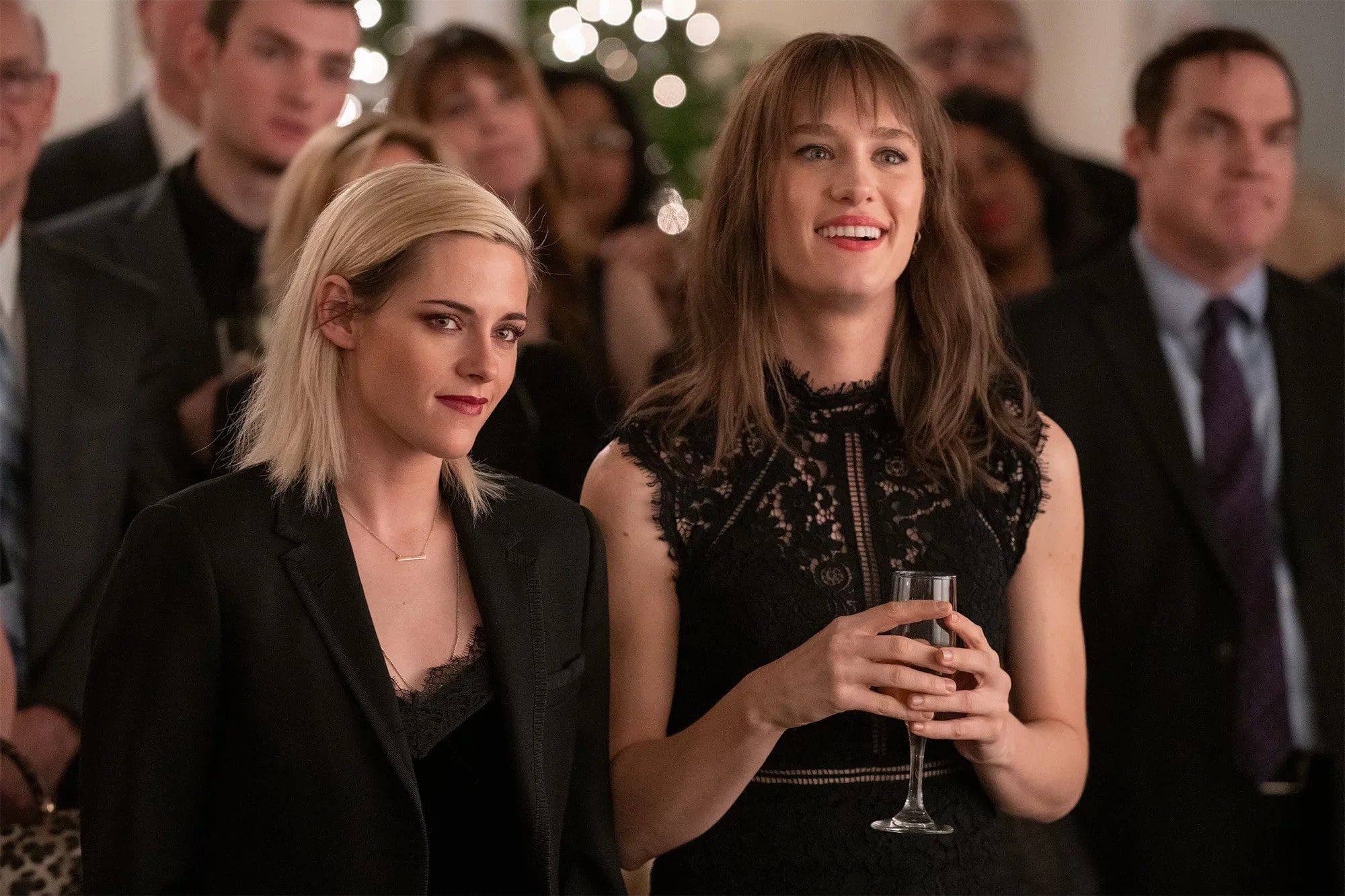
Though COVID-19 forced Sony to release Happiest Season on Hulu this holiday season, it was originally intended as a mainstream theater release. Thanks to Hallmark and Lifetime, holiday romances have become a staple for this time of year, but the film, co-written and directed by Clea DuVall, was finally going to provide audiences what those exercises in heteronormativity don’t: a queer couple in the lead roles.
That couple is played by Kristen Stewart and Mackenzie Davis as Abby and Harper, respectively. Anti-Christmas ever since her parents’ tragic death around the holiday years prior, Abby is convinced to partake in the holiday cheer after Harper invites her to spend the holiday with her family. However, things get awkward when Harper reveals that she hasn’t come out yet. Though Harper promises to tell them after Christmas, their lie not only forces Abby back into the closet, but makes her question if she really knows the woman she loves at all. As rom-coms go, Happiest Season fits right in with any classic entry in the genre and while that conventionality is precisely what many viewers will enjoy about it, that’s also what will leave others wishing for more.
Many of the plot and character elements will feel familiar to rom-com connoisseurs. There’s Dan Levy as John, the gay best friend who exists exclusively to give Abby advice and be ridiculous. There’s Alison Brie as Harper’s sister Sloane, a type-A, GOOP-loving super mom who’s in constant competition with Harper for their parents’ affection. There’s Mary Holland (who also co-wrote the script) as Jane, the quirky sister desperate to be included. Perhaps best of all is Mary Steenburgen as Harper’s mother Tipper, a passive-aggressive perfectionist who, when she asks Abby to take a picture of the family with her iPad, quickly dismisses each shot in turn in a way that feels both off-hand and pointedly personal.
At the center of all this comic madness is Stewart, who manages to keep Abby grounded in real emotions even as things around her get more outlandish. The undercurrent of self-conscious anxiety that characterized so much of Stewart’s early career and public persona has largely disappeared since her own coming out and she brings that same level of cool, somewhat aloof self-possession to her performance here. Despite her trauma, Abby knows exactly who she is now and the audience roots for her as she tries in small ways to connect with Harper’s family by complimenting a speech her father Ted (Victor Garber) gave while campaigning to become the town’s mayor or rolling with the punches when Tipper invites Harper’s high school boyfriend to dinner in hopes of getting them back together.
It’s particularly satisfying to see how comfortable Stewart is as the romantic hero in the film’s opening scenes, as she and Davis share a believable, comfortable chemistry, holding hands while strolling through their neighborhood or stealing moments of intimacy between comedy hijinks. Unfortunately, that early, easy chemistry is what makes it so jarring when Harper not only becomes a totally different person when she’s with anyone but Abby, but feel less and less like a real person as the film goes on. Admittedly, DuVall and Holland are making a point about how much being closeted can affect a person’s understanding and expression of their authentic selves, but the more dysfunctional Harper’s family dynamic reveals itself to be and the more Harper’s lack of self-acceptance hurts Abby, the more Happiest Season feels like a lesbian version of Get Out.
Indeed, the longer the film goes on, the more the audience wants to see Abby get out of this toxic situation and that’s only exacerbated by the glimpses we get of the very different, more subversive film Happiest Season could have been. That comes thanks largely to Aubrey Plaza’s character, Riley. Harper and Riley secretly dated in high school until Harper essentially outed her in order to hide her own queerness. So, Riley immediately recognizes and empathizes with Abby’s situation. Though Abby and Riley’s connection is only ever written as friendly, Stewart and Plaza share an immediate and undeniable sexual chemistry and as Riley takes Abby out to a drag bar to decompress or shares the honest discussions about being out and proud that Harper just can’t, it’s difficult to not wish they’d run off together or that the film were their story in the first place.
Unfortunately, that is not the film that DuVall set out to make and for better or worse, Happiest Season adheres to rom-com conventions with all the big speeches and physical comedy-filled climaxes that entails. In the end, Happiest Season is to holiday movies what the Pillsbury crescent roll is to holiday meals: comfortingly familiar, unsurprising and irrevocably commercial. It doesn’t break new ground structurally or emotionally, but its important to remember that its very existence as a major Hollywood studio product made by top-tier talent and geared toward a mainstream audience is in and of itself the subversion of the typical holiday romance. It may merely be an amuse bouche for a queer audience desperate for a full meal, but there is satisfaction in finally gaining entry into traditions previous generations couldn’t even consider.


Comments are closed.